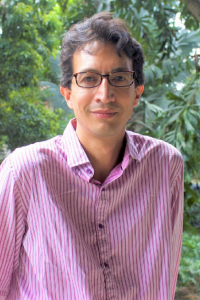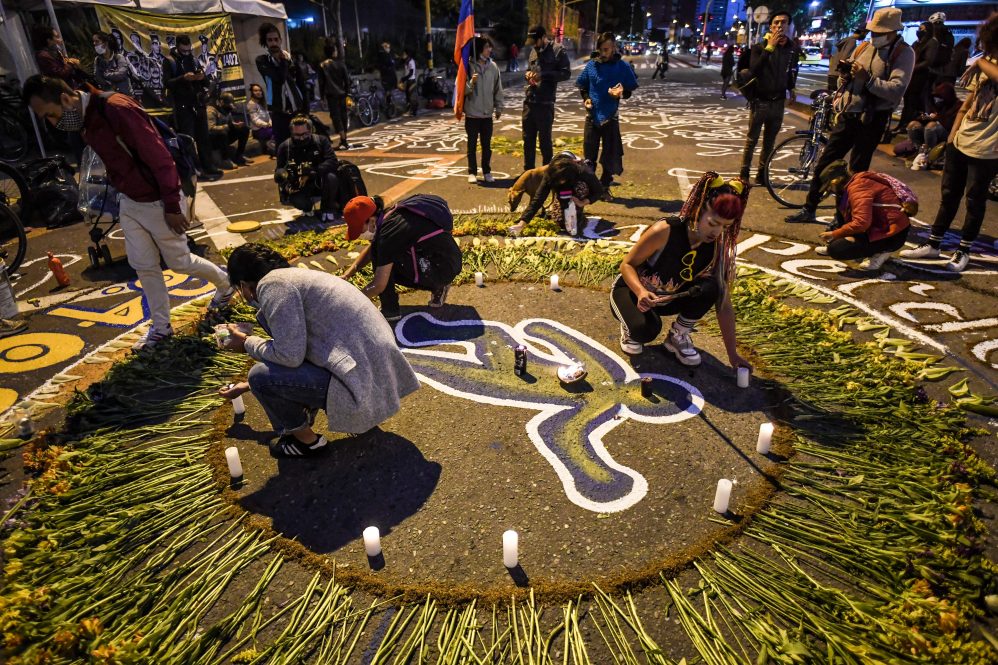What does it mean to live well? To live beautifully? To live in harmony?
And what does it mean to live beautifully in a place besieged by conflict, corruption, drug trade, and unfulfilled promises?
As peaceful protesters continue to find themselves faced with imprisonment and police violence in Colombia, UConn researchers are embarking on a collaborative, interdisciplinary project to support the promise of Buen Vivir – of living well or living in harmony – and to see if the lessons of one rural, intercultural community can help promote well-being in other communities in Colombia and around the globe.
“One of the mandates of the peace accord was to build a national plan for rural health, and that national plan has to incorporate principles behind living well or living beautifully,” says César Abadía-Barrero, an associate professor of anthropology and human rights at UConn and director of undergraduate programs at UConn’s Human Rights Institute. “So, you have these communities really making an effort to build this larger notion of what ‘well-being’ means, and how rights could be granted. But of course, the rural areas where all of this is happening are the areas where you have new waves of violence because of the government not fulfilling its promises.”
A medical anthropologist who has long studied health disparities in his native country, Abadía-Barrero received his degree in dentistry from the Universidad Nacional de Colombia, but was already a professor at UConn when the Colombian peace agreement was signed in 2016. The accord was the culmination of a years-long peace process meant to end conflict between the government and the oldest guerilla in the continent, FARC-EP, a conflict that had raged for over five decades.

While the peace process brought the armed conflict to a close, Colombian unrest has continued, as the ceasefire has given rise to protest over extreme social inequities and political violence that persist in the country.
“While the peace accord has really moved the country forward in terms of the former guerrilla members giving up their arms and reincorporating into civil society, reducing dramatically the number of people being killed out of the armed conflict,” Abadía-Barrero says, “all these other pieces of the accord – which warranted new sets of conditions in society, a new social contract, and that people would live with dignity, security and jobs– have not been fulfilled by the government.”
This year, the straw that broke the camel’s back, Abadía-Barrero explains, was a proposed tax reform that would have increased taxes on individuals and small businesses while maintaining many tax exemptions for the wealthy – proposals that those opposed said would put yet another burden on middle-class and poor families in a country already known as one of the most unequal in the world.
The tax reform sparked mass protests in Colombia in late April 2021, and while the proposals were withdrawn, the protests have continued as demonstrators from a wide variety of communities have seized upon the moment to speak out about the country’s structural inequalities, lack of educational opportunities, land use policies, lack of accessible health care, and overwhelming poverty.
“There are two very important players in the new protests,” says Abadía-Barrero. “The first is young people, who have been pushed out of educational opportunities – they are really destined to lives of precarity without being able to access education or job opportunities. And the other big player has been Indigenous communities.”
He continues, “Indigenous communities have always been an incredible force, but the difference now is that they have become a moral symbol of the struggle, and Indigenous agendas have really resonated with larger sectors of society in terms of their understanding of how we should relate with nature, for example, with Mother Earth, as they call it. And it has resonated importantly in times of climate change and food security crisis, and also through the legacies of racism, colonialism, and corruption.”
The rise of protest has also meant a rise in incidents of police brutality, as police forces – some armed and trained by foreign actors, like the United States – have deployed tactics used to fight guerillas and paramilitary forces against civilian protestors. The non-governmental organization Temblores, which has been tracking reports of incidents during the Colombian protests, has reported more than 4,200 acts of violence allegedly committed by members of security forces as of June 16, 2021.
“There are cases of direct shootings from police to peaceful civilians, unarmed people,” says Abadía-Barrero. “They have been targeting people. Cases of sexual violence have been reported. They have been going into neighborhoods and houses. There have been kidnappings and torture by military forces and the special police anti-riot force, which is the main actor behind the current human rights violations.”
Democracy at a Crossroads
The Inter-American Commission on Human Rights (IACHR) visited the country in early June to investigate the allegations of human rights violations during the protests.
While daily protests have recently given way to more targeted protesting, assembly, and activism, the unrest in Colombia is ongoing, as the government refuses to negotiate or even engage in discussion with protesters and police violence and targeting of demonstrators continues.
“Colombian democracy is at a crossroads, on the one side you have this wonderful flourishing of democracy in people hands – everybody is debating key societal issues in local assemblies, creating popular activities to educate and support the peaceful protests, and innovating with art-based initiatives, which is very exciting,” says Abadía-Barrero, who co-organized the recent webinar, “Colombian Democracy at a Crossroads,” cosponsored by UConn’s Dodd Impact and Memoria Viva, that featured academics, activists, lawyers, and on-the-ground leaders of the Colombian protests.
“But on the other side,” he says, “you have a government that is more and more authoritarian, and really pushing for more militarization, and not wanting to open up to real dialogue, conversations, negotiations. And so we are in a moment that it’s very difficult to know what’s going to happen. We are exactly at that crossroads.”
It’s within this flourishing of democracy that Abadía-Barrero and his team are embarking on their examination of Buen Vivir – a concept of well-being that was intrinsic to the peace accord and is guided by Indigenous principles.
“Can we create new indicators of well-being using this Indigenous concept of Buen Vivir, which is one of the big goals of the research?” he asks. “Can we think of human well-being differently from the traditional way we think about well-being as accumulating – accumulating stuff for ourselves – but rather think about harmony with others, harmony with nature, harmony with the community?”
Inspired by Indigenous Concepts about Humans and the Earth
His project is a collaboration between a multidisciplinary academic group and the Red SaludPaz Health Peace Network – a group of university institutions and social organizations committed to building a peaceful Colombian society – that is working directly with a small, intercultural village in Colombia’s Caquetá region, which spans Andean mountains and Amazonian plains.
The region is one of the most effected by Amazonian deforestation that occurred following the peace accord. The community Abadía-Barrero’s team is working with – a community called El Manantial in Spanish or “Water Spring” in English – is home to families from two Indigenous groups as well as farmers displaced by violence. Initially established as an illegal settlement in former cattle ranching land, members of the community purchased communal land in the 1990s and began a process of reforestation aimed at preserving biodiversity and water sources. The community’s former grasslands are now secondary forest.
Their efforts, Abadía-Barrero says, have been guided by long processes of negotiation between Indigenous community members and settlers, inspired by Indigenous concepts about the relationship between humans and Mother Earth. They hope to use land reforestation and biodiversity preservation as a means of creating an eco-tourism initiative to help support the community.
“What we are seeing in this community is that people are now following the Indigenous leaders – in their guidance, in their knowledge, in their practices – to not only recuperate the land, but to create a new sense of life’s meaning in which humans are a part of nature and not nature’s masters,” he says. “We are really drawing on Indigenous and ancestral thinking. They are the ones who have known for thousands and thousands of years how to coexist with nature, not in an exploitative or destructive way. What could this be offering in terms of solutions to the climate crisis? How we can recuperate nature and recuperate society around nature?”
Adapting as History Unfolds
Abadía-Barrero’s goal in the project is to create an index or indicator that establishes a baseline of well-being in the community, developing novel tools to describe and measure Buen Vivir. The project also hopes to support the community by implementing plans to support reforestation around the main water springs that serve the community’s water needs, and by conducting a sustainable agricultural pilot study that integrates permaculture principles and traditional farming practices to help support food sovereignty initiatives.
“Can we capture how communities can move forward, and the ways that this is beneficial both in biological and ecosystem integrity’s terms?” he says. “Can we create new indicators of well-being using this Indigenous concept of Buen Vivir? If we can expand that indicator, show how people’s frames of mind are shifting from the current environmental catastrophes to new ways of thinking, then we might be able to offer some of the answers for a path forward – see if we can make the ideas behind this indicator useful for other parts of the country, or even the world – other communities that are in similar processes.”
The multidisciplinary partnership includes a number of groups and institutions, both at UConn – including UConn’s Human Rights Institute, Institute for Systems Genomics (ISG); Institute for Collaboration on Health, Intervention, and Policy (InCHIP); Institute for the Environment; Departments of Economics, Political Science, Anthropology, and Human Development and Family Sciences; Center for Genomic Innovation; School of Nursing; and Marine Sciences – and in Colombia – including the Universidad de la Amazonia, the Universidad Nacional de Colombia, and Museo Nacional de Colombia.
While it’s impossible for him to predict what the outcome of the current protests in Colombia will be, Abadía-Barrero says his team will adapt to the situation in order to work toward and promote the promise of Buen Vivir.
“The unfolding of the peace accord at this moment in Colombian history, and in world history, is being derailed by this right-wing government that doesn’t want to open up to democratic dialogue and to commit to the changes promised in the peace accord,” Abadía-Barrero says. “We’re in that crux of the moment. Our project, which breaches scholarship in human rights with a lot of human rights activism, support, and solidarity for the communities that are on the ground, will continue, regardless of the course of events.”
He continues, “We will adapt and accommodate to whatever happens to make the project meaningful and to speak directly to what’s happening in these conditions of the unfolding of the peace accord and the threat to democracy.”
To learn more about the work of UConn’s Human Rights Institute, visit humanrights.uconn.edu.



